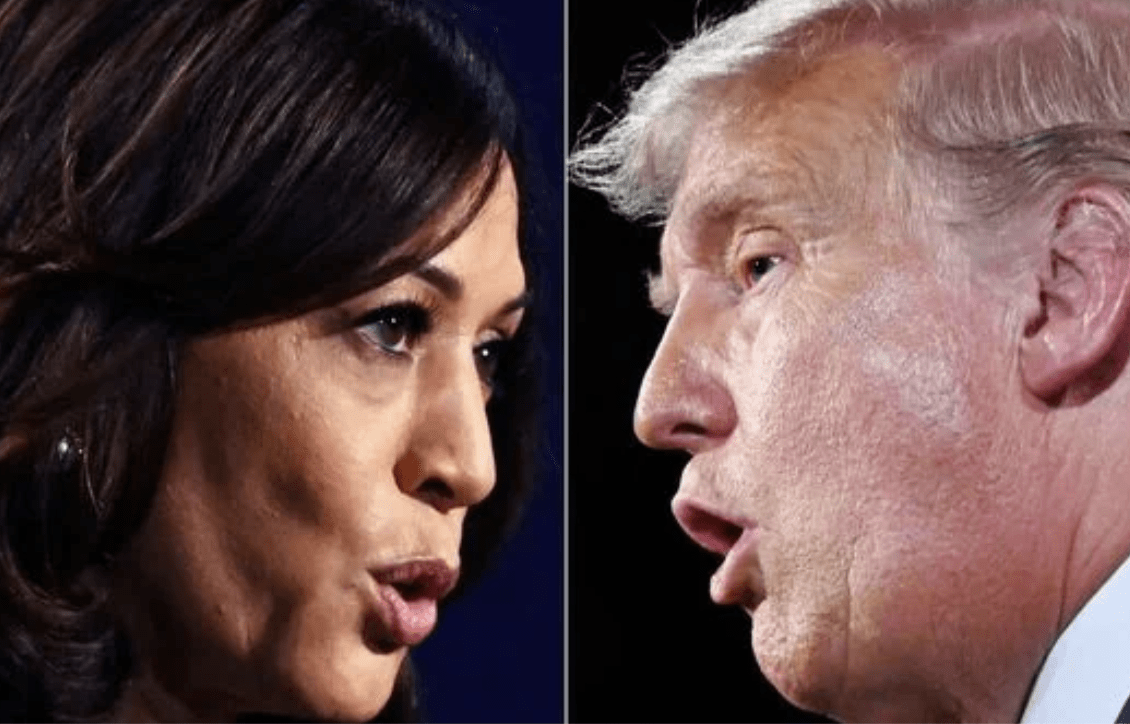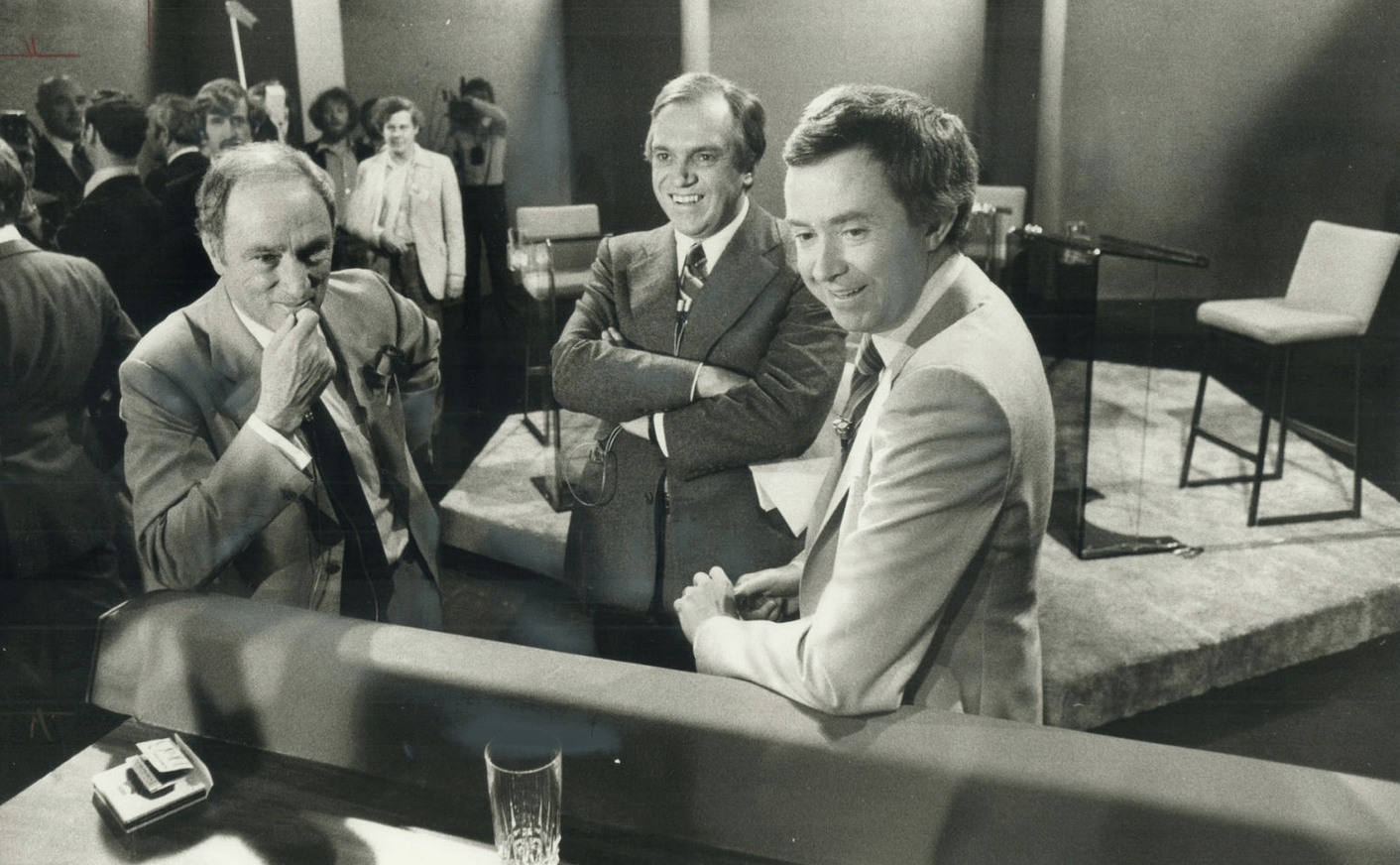Will Trump Debate Harris, or Chicken Out*?
 Reuters
Reuters
By Robin V. Sears
August 7, 2024
In every election campaign in every western democracy going back as far as that first, famously pivotal, televised Kennedy-Nixon debate in 1960, debates have served as a potentially decisive inflection point on the road to election day. But this 2024 US presidential campaign has completely re-set the political mythology around a single debate’s potential, asymmetrical impact based on President Joe Biden’s fateful June 27 performance.
Yet, campaign debates have always been a gamble; incumbents inevitably forced to play defence, and any green challenger facing a possible loss against a seasoned debate pro.
In the North American tradition that defines Policy readers’ immediate orbit of interest on this question — Canadian and American history on prime ministerial and presidential debates, from that Kennedy/Nixon “Lazy Shave” debacle to the 1984 Mulroney-Turner knockout to the debate that sealed Biden’s fate as a candidate — the pressing question now looms as to whether Donald Trump will debate Kamala Harris, and J. D. Vance will debate her running mate, Minnesota Governor Tim Walz.
At this writing, Trump has just told Fox News that he will debate Harris “in the pretty near future”. “I want to debate her. I think it’s important for the country that we debate,” he said.
For the mercurial former president, the choice is surely one between that diabolical voice on one shoulder assuring him that he “won” the last debate and dispatched a sitting president and the insecure-id chatter on his other shoulder petrified of facing Kamala Harris on a debate stage. Meanwhile, for his idiosyncratic running mate, the debate plot has thickened.
In his rollout as Democratic VP choice in Philadelphia Tuesday evening, Walz’s biggest laugh line was that he couldn’t wait to debate Vance, “If he’s willing to get off his couch and show up.” That reference to an apocryphal story circulating on the internet about Vance having an intimate encounter with a sofa brought the house down and telegraphed Walz’s tactical utility to Harris as the messenger whose original description of Trump and Vance as “weird” went viral.
Davey played all his opponents’ negotiators (including me) like a fiddle for weeks, declaring he wanted a debate but then squabbling behind closed doors over cameras, moderators, and timing.
Even in normal times, debates are the most challenging strategic decision any Canadian or American campaign manager faces. In Europe, and many other democracies, they are a must-do, but not always in Canada.
Much as pundits and academics typically argue in favour of the power of a debate win, a good strategist always assesses the risks and rewards with a more skeptical eye.
Keith Davey, the godfather of Canadian political strategists, managed Pierre Trudeau’s campaigns, winning four out of five. In 1980, the surprise follow-up to the Liberals’ losing campaign less than a year earlier, he was unconvinced that, despite Pierre Trudeau’s greater debate skills than his opponent’s, a debate ‘win’ would actually help their campaign. Why? Because he knew that the more voters saw of Trudeau, the less likely they were to vote Liberal. Canadian views ran from deep antipathy to mild irritation with the leader they had known for 12 years. Sound familiar?
Davey also knew that saying a flat “no” to a debate would fall into the ‘arrogant Trudeau,’ trap. So, he played all his opponents’ negotiators (including me) like a fiddle for weeks, declaring he wanted a debate but then squabbling behind closed doors over cameras, moderators, and timing. It was the right choice, played very skillfully. There were no debates, and Trudeau won.
The lens that campaigners and journalists apply to debate risk are very different. Journalists still hunger for the smackdown victory, as it makes a great story. Campaigners know that those come once in a blue moon and typically come out of left field. None of John Turner’s team could ever have predicted that their guy would lose on a question about patronage. But it was Brian Mulroney’s brilliant opportunistic knife blow that is remembered four decades later.
Some political historians give too much weight to gaffes as the greatest downside risk. Gerald Ford claiming that the Soviet Union did not control Poland in the depths of the cold war was a serious bungle, but it merely helped confirm a broader anxiety about the man and his ability to govern. In 2012, Barack Obama badly bungled his first debate against Mitt Romney and went on to a great victory.
 Prime Minister Pierre Trudeau, NDP Leader Ed Broadbent and Conservative Leader Joe Clark before the 1979 leader’s debate/Toronto Star archive via Toronto Public Library
Prime Minister Pierre Trudeau, NDP Leader Ed Broadbent and Conservative Leader Joe Clark before the 1979 leader’s debate/Toronto Star archive via Toronto Public Library
This apparent contradiction between a ‘bad debate’ and an election victory reveals the reason that debates are such a nail-biter for those who have to decide to debate or not. It’s because debates are not about policy or performance alone. They are more importantly about character, personality and likability.
The viewers’ decisions on those more emotional and subjective tests can be mystifying, but a consensus is usually widely shared. Hard as it may be for many to see past the nasty stew of misogyny, racism, and bald-faced lies that are Trump’s metier, there is apparently a percentage of voters who actually like his bad-boy demeanor.
Debates typically offer confirmation of existing enthusiasms and dislikes. Rarely, a shockingly bad performance can overturn a pre-debate consensus. Biden’s debate meltdown hurt him so badly because he had one ‘senior moment’ too many. It forced a change of heart among even his closest friends and allies. Despite his long list of achievements, his likability, and his demonstrated experience and skill at political craft, the stumbling old man who appeared that night doomed his campaign.
Biden’s campaign team deserves a slice of the blame, however. What are old people universally bad at? Numbers, dates, and names. They over-briefed him on each of them hoping to bridge those gaps. Instead, they should have prepped him on how to attack and humiliate Trump.
The entry of Harris and now Walz as Trump and Vance’s opponents has already upended Trump’s campaign plan. It’s no longer ‘Sleepy Joe Biden’, it’s now ‘Ranting, Rambling Old Trump’.
If he had started the night with, “My fellow Americans, thank you for the great honour of once again being able to seek your support to build a better America for all our people. Like you, I love our country. Sadly, my opponent is disgraceful in his attacks on America. He calls us a ‘stupid country, governed by stupid people.’ Let me tell you what’s stupid: someone who thinks he can win the support of Americans by attacking our great nation.”
If he then continued to pull examples from Trump’s warehouse of lies on any theme that emerged, he might have survived. His inner circle knew how vulnerable Trump was to such blows, how rattled he got when humiliated, and they failed to attack any of his vulnerabilities.
The entry of Harris and now Walz as Trump and Vance’s opponents has already upended Trump’s campaign plan. It’s no longer ‘Sleepy Joe Biden’, it’s now ‘Ranting, Rambling Old Trump’. His disastrous choice of running mate will now meet a very likeable, tried and tested governor with five years of experience running a government, and a campaigner with great communication skills, as evidenced in his Philly debut.
The shallow shorthand of too many pundits and of course all of Trumpland, that Walz is too left-wing, is untenable nonsense for them to campaign on. He defeated Republicans from a base in the most conservative rural part of Minnesota five times over a decade. He has a record on abortion, cost-of-living, racial justice among a long list of popular achievements that further highlight the empty-headed rhetoric of his opponent. On the other side, a man with less than 20 months — months — of political experience would be next in line to be president if Trump wins and then cannot complete his term.
The Trump campaign could adopt a version of the Davey debate strategy: Declare your determination to have both presidential and vice-presidential debates, quietly sabotage any such prospect behind the curtain and then call your opponent a chicken. The problem for Trump being, of course, that nobody will believe the cover story. More likely, the Harris campaign will adopt a variation of Bill Clinton’s 1992 “Chicken George” stunt of dispatching men in chicken costumes to troll President George H. W. Bush’s campaign events following his refusal to debate Clinton.
Already, Trump has essentially declared: “New candidate, new rules…mine!” attempting the deflection of a staged event on Fox News with a stadium full of MAGA props. Harris campaign sources have made it clear that the debate Trump previously agreed to, on September 10, is the only one they will do.
For any campaign with relatively new and/or relatively unknown candidates, debates provide national profile. If their candidates are good performers and likable people, simply emerging smiling with few scratches is a big victory. There’s not likely to be a repeat of what happened to Biden in a contest between Trump and Harris, or Walz and Vance for that matter.
When you add to the usual strategic calculations the very real prospect of Trump and/or Vance losing both debates, ducking them altogether may be more compelling, despite their having to endure chants of “Chicken! Chicken!” ringing in their ears.
Policy Contributing Writer Robin V. Sears is a longtime political strategist who has advised world leaders from German Chancellor Willy Brandt to Canadian NDP Leader Ed Broadbent to Conservative Prime Minister Brian Mulroney. He also served as a senior consultant to the Washington-based National Democractic Institute.
